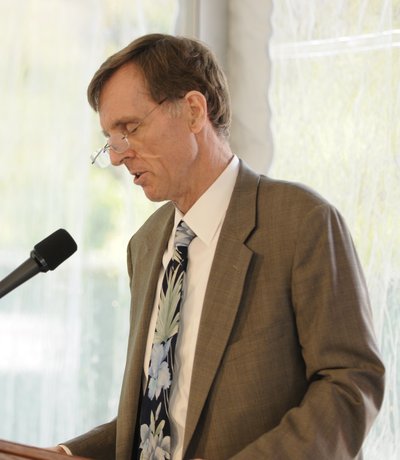Andrew Abbott's Groundbreaking Ceremony Remarks

Photo by Dan Dry
It is the peculiar genius of the University of Chicago that every major question - however it may have begun - becomes in the last analysis an intellectual question. Whether staff or admistrators or faculty, we all make minor decisions every day on the basis of this or that expediency: the availability of resources, the tradeoffs of time, the exigencies of the moment. But when major questions arise, someone always raises the central intellectual issues and like an old army frittering away its time in garrison we tumble out of our comfortable billets, throw on our gear, and head back into the field, to take on the big issues in dubious battle upon the plains of intellectual strife.
So it has been with this magnificent library. When Martin Runkle told Richard Saller five years ago that Regenstein would soon be full, the troops heard the call in the distance. A faculty committee chaired by Richard Helmholz considered options on- and off-site, and immediately issues of research practice began to arise. How do faculty actually do research? What do students do in the library now and how is that changing? It was dissatisfaction with our knowledge about these questions as much as with the two drastic options considered by that committee that led to the formation of the joint faculty/librarian Task Force on the Future of the University Library. Faculty interest and concern grew; conversations percolated in the corridors and the coffee shops. Under Judi Nadler's charismatic leadership, the librarians began to make clearer plans and to think in detail about more complex options. It is striking too that in this phase the outside consultants who had drafted original options for the Helmholz Committee disappeared from the process. This had become our battle, to fight out among ourselves, in our own way, on the basis of the real intellectual issues.
From the Task Force process emerged not only a detailed study of our library that is unmatched in the current library literature, but also the beginnings of a theory of library research. Surprisingly, such a theory has never existed. No one has ever sat down and asked how exactly it is that knowledge is produced by the activities of hundreds of lone scholars going into a big building full of books, reading sources to which their hunches and intuitions guide them, and then writing up their thoughts, which in turn go into the library for the next scholar to read. We have dozens of theories of scientific knowledge, but no real theory of this other form of knowledge, and indeed there remain skeptics who are not fully persuaded that it is knowledge.
This question of the normative form of library-based knowledge is the intellectual puzzle that has emerged from the debate among faculty, students, librarians, administrators, trustees, and others as the core intellectual question involved in building this library. And it is because we have confidence in our preliminary answers to that question that we have decided as a community to do what no other university in the United States is doing - to build a great new library.
We are indeed at a crossroads. The vast technological revolution in the storage and retrieval of information is seducing us into thinking that storage and retrieval of information are the central techniques of knowing and that whatever those things enable is what we shall call knowledge. This library stands for our belief that at least one crucial variety of knowing - the variety that dominates the humanities and social sciences - is something other than just storage and retrieval. It is about well-prepared scholars being able to swim easily in a sea of densely organized material, following immediately the leads that arise at every turn of the research process and tracing the connections wherever they may go.
We do not yet know exactly what this kind of knowing is, how to characterize it, how to set it forth, how exactly to support it. But the challenge of deciding about this library has made us see that these are central questions, not just for the University of Chicago, but for all critical knowledge in the humanities and the social sciences. The Mansueto Library stands for our belief that these questions have answers and that we can and will find them. On behalf of the faculty, I would like to thank the Mansuetos for joining us in this belief and making it possible for us to create a library that will be a beacon and an example throughout the world of knowledge.
Andrew Abbott is the Gustavus F. and Ann M. Swift Distinguished Service Professor of the Department of Sociology and the College at the University of Chicago.